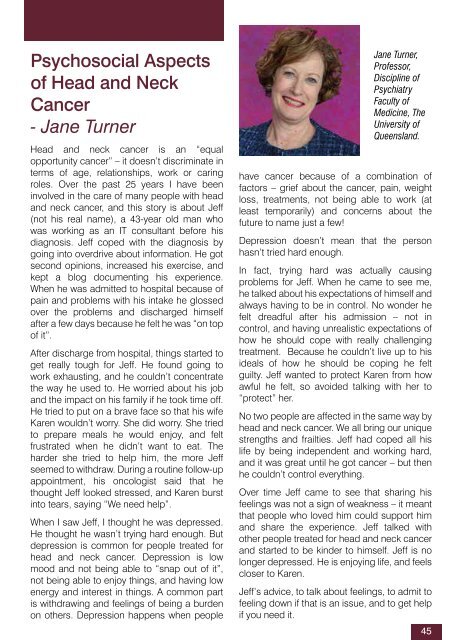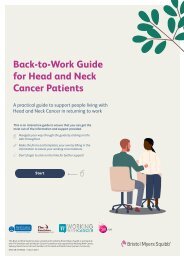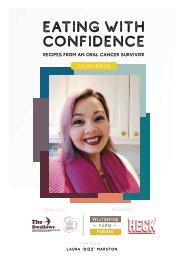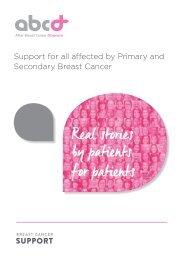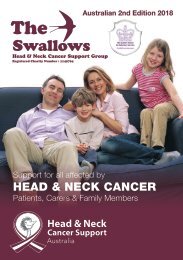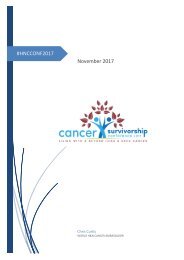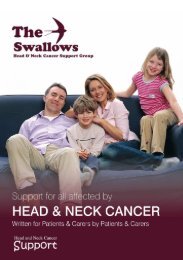The Swallows Australian Edition Magazine
You also want an ePaper? Increase the reach of your titles
YUMPU automatically turns print PDFs into web optimized ePapers that Google loves.
Psychosocial Aspects<br />
of Head and Neck<br />
Cancer<br />
- Jane Turner<br />
Head and neck cancer is an “equal<br />
opportunity cancer” – it doesn’t discriminate in<br />
terms of age, relationships, work or caring<br />
roles. Over the past 25 years I have been<br />
involved in the care of many people with head<br />
and neck cancer, and this story is about Jeff<br />
(not his real name), a 43-year old man who<br />
was working as an IT consultant before his<br />
diagnosis. Jeff coped with the diagnosis by<br />
going into overdrive about information. He got<br />
second opinions, increased his exercise, and<br />
kept a blog documenting his experience.<br />
When he was admitted to hospital because of<br />
pain and problems with his intake he glossed<br />
over the problems and discharged himself<br />
after a few days because he felt he was “on top<br />
of it”.<br />
After discharge from hospital, things started to<br />
get really tough for Jeff. He found going to<br />
work exhausting, and he couldn’t concentrate<br />
the way he used to. He worried about his job<br />
and the impact on his family if he took time off.<br />
He tried to put on a brave face so that his wife<br />
Karen wouldn’t worry. She did worry. She tried<br />
to prepare meals he would enjoy, and felt<br />
frustrated when he didn’t want to eat. <strong>The</strong><br />
harder she tried to help him, the more Jeff<br />
seemed to withdraw. During a routine follow-up<br />
appointment, his oncologist said that he<br />
thought Jeff looked stressed, and Karen burst<br />
into tears, saying “We need help”.<br />
When I saw Jeff, I thought he was depressed.<br />
He thought he wasn’t trying hard enough. But<br />
depression is common for people treated for<br />
head and neck cancer. Depression is low<br />
mood and not being able to “snap out of it”,<br />
not being able to enjoy things, and having low<br />
energy and interest in things. A common part<br />
is withdrawing and feelings of being a burden<br />
on others. Depression happens when people<br />
Jane Turner,<br />
Professor,<br />
Discipline of<br />
Psychiatry<br />
Faculty of<br />
Medicine, <strong>The</strong><br />
University of<br />
Queensland.<br />
have cancer because of a combination of<br />
factors – grief about the cancer, pain, weight<br />
loss, treatments, not being able to work (at<br />
least temporarily) and concerns about the<br />
future to name just a few!<br />
Depression doesn’t mean that the person<br />
hasn’t tried hard enough.<br />
In fact, trying hard was actually causing<br />
problems for Jeff. When he came to see me,<br />
he talked about his expectations of himself and<br />
always having to be in control. No wonder he<br />
felt dreadful after his admission – not in<br />
control, and having unrealistic expectations of<br />
how he should cope with really challenging<br />
treatment. Because he couldn’t live up to his<br />
ideals of how he should be coping he felt<br />
guilty. Jeff wanted to protect Karen from how<br />
awful he felt, so avoided talking with her to<br />
“protect” her.<br />
No two people are affected in the same way by<br />
head and neck cancer. We all bring our unique<br />
strengths and frailties. Jeff had coped all his<br />
life by being independent and working hard,<br />
and it was great until he got cancer – but then<br />
he couldn’t control everything.<br />
Over time Jeff came to see that sharing his<br />
feelings was not a sign of weakness – it meant<br />
that people who loved him could support him<br />
and share the experience. Jeff talked with<br />
other people treated for head and neck cancer<br />
and started to be kinder to himself. Jeff is no<br />
longer depressed. He is enjoying life, and feels<br />
closer to Karen.<br />
Jeff’s advice, to talk about feelings, to admit to<br />
feeling down if that is an issue, and to get help<br />
if you need it.<br />
45


